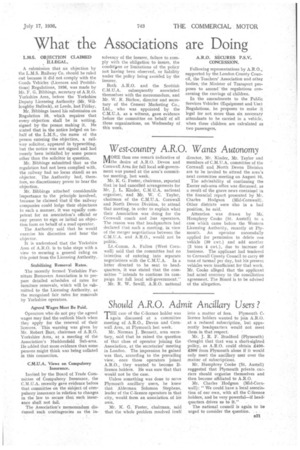Should A.R.O. Admit Ancillary Users ?
Page 31

If you've noticed an error in this article please click here to report it so we can fix it.
THE case of the C-licence holder was
• again discussed at a committee meeting of A.R.O., Devon and Cornwall Area, at Plymouth last week.
Mr. Norman J. Bennett, area secretary, said that he raised the question of that class of operator joining the Association, at the secretaries' meeting in London, The impression he gained was that, according to the prevailing view, once those operators joined A.R.O., they wanted to become Blicence holders. He was sure that that would not be the case.
Unless something was done to serve Plymouth ancillary users, he knew that Alderman Solomon Stephens, leader of the C-licence operators in that city, would form an association of his
own.
Mr. IC. G. Foster, chairman, said that the whole problem resolved itself into a matter of fees. Plymouth Clicence holders wanted to join A.R.O. at a reduced subscription, but apparently headquarters would not meet them in that respect.
Mr. J. R. F. Bradford (Plymouth) thought that that wa_s a shoit-sighted policy, as A.R.O. could obtain 400 500 from Plymouth alone if it would only meet the ancillary user over the matter of subscriptions.
Mr. Humphrey Cooke (St. Austell) suggested that Plymouth private carriers should organize themselves and then become affiliated to A.R.O.
Mr. Charles Hodgson (Mid-Cornwall): "We could have a local association of our own, with all the C-licence holders, and be very powerful—if head quarters drives us to it."
The national council is again to be urged to consider the question.




















































































